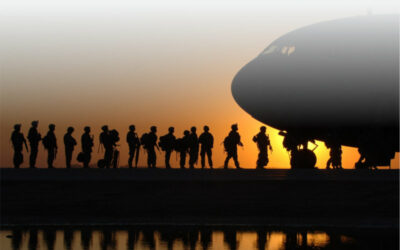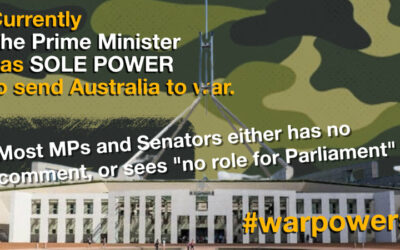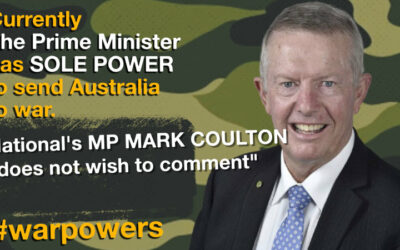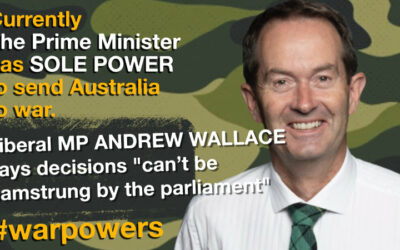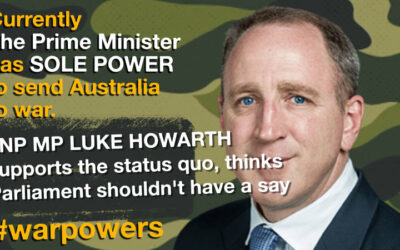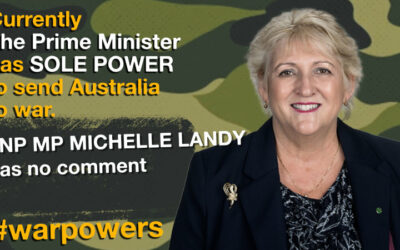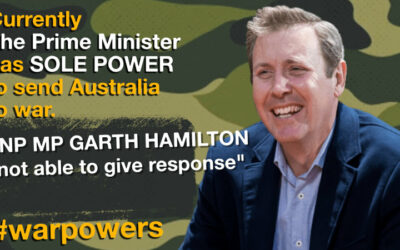On what grounds do we put boots on the ground? Australian politicians have been mostly unwilling to cede control of declarations of war to parliament. When it comes to committing troops, our closest security partners have moved towards parliamentary votes, but in most cases the leadership reserves the final say, writes Zacharias Szumer.
Through the AUKUS security pact and Five Eyes intelligence alliance, Australia’s main military allies are the United Kingdom, the United States, Canada and New Zealand. Though these nations may share strategic goals, they have quite different political arrangements for managing the deployment of troops into conflict zones. Among Australia’s allies, fellow Commonwealth nations are still bound by the less-democratic traditions of the UK, but have faced some political pressure for reform. However, even in the ‘mother country’, old conventions are gradually becoming unstuck. On paper, the US has the most democratic war-making arrangements, but presidents have routinely stretched the limits of their powers.
The United Kingdom
Like many of Australia’s political conventions, the prime minister’s power to deploy armed forces without the approval of parliament derives from the UK. Originally this was known as the ‘royal prerogative’, which as the name suggests was exercised by monarchs. This power later passed on to elected governments.
In the post-WWII period, the UK government frequently sent troops abroad without holding a parliamentary vote. Although the House of Commons expressed its support for British involvement in the Korean War in 1950, there was no vote on the Suez Crisis of 1956, the Falklands War in 1982, or NATO’s Kosovo campaign in 1999. However, in the past two decades a political convention of parliamentary approval has emerged.
The first observance of this convention came in 2003, when Prime Minister Tony Blair was pressured into holding a parliamentary vote to participate in the Iraq War — a vote that Blair won with nearly two-thirds of MPs in favour. Blair said that ‘the reality is that governments are in the end accountable to Parliament, … and they are accountable for any war that they engage in, as they are for anything else.’
Since then there have been several attempts to enshrine the convention in statute, but none have been successful. Given its vague legal standing, the convention has been applied inconsistently. In 2011, the UK Parliament debated the UK’s military operation in Libya, but only after it had begun. There was no vote over the UK’s military deployment to Mali in January 2013. However, the convention was respected in 2013 when the Cameron government was denied parliamentary approval to use military force in Syria.
Political analyst Philippe Lagasse concludes that this 2013 vote set an important precedent: ‘By allowing the House to decide Britain’s involvement, the prime minister suggested that the authority to decide the deployments was now divided between the executive and legislature; the legal authority to send the armed forces remains with the government, but the political authority to dispatch them rested with parliamentarians’.
The United States
The United States wages war in a somewhat more democratic fashion than the US or UK but, in practice, parliamentary control over the military is complex and contentious. Although the US Constitution makes the President the commander-in-chief of the armed forces, it grants to Congress the power to declare war, to raise and support armies, and to provide and maintain a navy.
Virtually all military deployments prior to 1950 — including both world wars — were made with congressional approval. However, this bipartisanship was broken in 1950 when President Truman sent troops into Korea without seeking congressional authority. Although the 1964 Gulf of Tonkin Resolution authorised the use of military force in South-East Asia, the Vietnam War continued even after the resolution was repealed in 1971, with President Nixon citing his authority as commander-in-chief of the military under the Constitution.
In response to what was felt to be presidential overreach, a 1973 law was passed mandating that the president notify Congress within 48 hours of deploying the military. This notification triggers a 60-day period, after which troops must be recalled if congressional support is not granted. Like the UK’s parliamentary convention, this law has also been applied inconsistently, and there is significant tension and legal argument over the division of powers between the president and Congress.
Grey Expectations: where Coalition, Labor, cross-bench stand on war powers reform
Two separate congressional authorisations were granted in 2001 and 2002 for the invasions of Afghanistan and Iraq respectively. However, these authorisations have been controversial due to the lack of specificity regarding the enemy, geographic location, or duration of the military deployment. The authorisation for the invasion of Iraq was later invoked by President Obama during the military campaign against ISIS and by the Trump administration for the 2020 assassination of Iranian general Qassem Soleimani. Both Obama and Trump also launched other military campaigns and strikes without seeking the validation of Congress.
New Zealand
Like Australia, New Zealand inherited Westminster-style war powers, under which the prime minister has ultimate power to deploy troops overseas. The country’s short Constitution, only adopted in 1986, doesn’t include guidance on which branch of government should have authority over military deployments. In practice, military deployments are debated in parliament — sometimes after the fact — and authority is retained by the executive.
Helen Clark’s Labour government offered troops to the US within several days of the September 11 attacks in 2001, only referring the decision to the parliament almost a month later. As former Liberal Party leader Brendan Nelson writes, “Prime Minister Clark emphasised that although the government did not need the approval of parliament, she brought the matter to a vote because she ‘wanted the troops to know … they had the full support of MPs’.” Kiwi soldiers were also deployed to Afghanistan in 2001 and Iraq in 2003 without parliamentary approval.
In 2014 Prime Minister John Key rejected a suggestion that the parliament should be allowed to decide whether NZ soldiers were deployed to Iraq to fight the Islamic State. Neither of New Zealand’s major parties have shown much appetite for changing the current arrangements, leaving the Kiwi Greens as the only party to pursue war powers reform. However, the country’s largest newspaper, The New Zealand Herald, expressed its support for war powers reform in a 2014 editorial.
Canada
Like New Zealand and Australia, Canada has an unreformed version of the Westminster model. If Canadian forces are put on ‘‘active service’’, the government is required to assemble parliament within seven days, but parliament does not have the legal authority to overrule the prime minister’s decision.
Both major parties have previously made commitments to reform war powers, but no substantial changes have been legislated. Campaigning ahead of the 2006 election, the Conservative Party promised to ‘‘make Parliament responsible for exercising oversight over … the commitment of Canadian Forces to foreign operations’’.
After winning the election, Conservative leader Stephen Harper did hold a parliamentary vote on an extension of the Canadian military operation in Afghanistan. However, prior to the vote, he declared that his government would not be bound by the outcome of the vote, but only take the parliament’s decision into account. The government held a series of votes that prolonged Canada’s involvement in Afghanistan until 2011. However, Canadian troops remained in Afghanistan as part of a ‘non-combat training mission’ without any parliamentary vote being held.
In 2014 the Harper government carried out a parliamentary vote on air strikes against the Islamic State in Iraq but didn’t ask for parliamentary approval over Canadian military involvement in the 2014 conflict in Ukraine. As political analyst Philippe Lagasse puts it, despite the parliamentary votes, the prime minister ‘retained his discretion to interpret how and when Parliament should be consulted … consulting the House was cast as a courtesy, one that allowed the government to hear dissenting views and test the mood of the Commons.’
When discussing changes to the Canadian military’s mission in Iraq in 2016, Prime Minister Justin Trudeau said that, while his government respected the importance of parliamentary debate, it ultimately ‘‘recognise[d] the exclusive role of the executive in military matters’’.
Zacharias Szumer is a freelance writer from Melbourne. In addition to Michael West Media, he has written for The Monthly, Overland, Jacobin, The Quietus, The South China Morning Post and other outlets.
He was also responsible for our War Power Reforms series.


